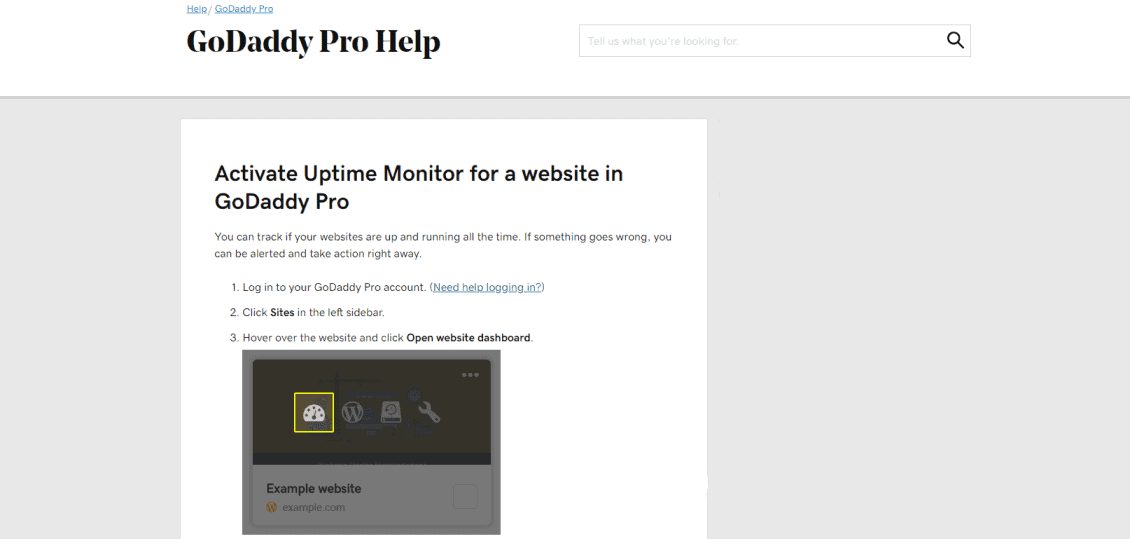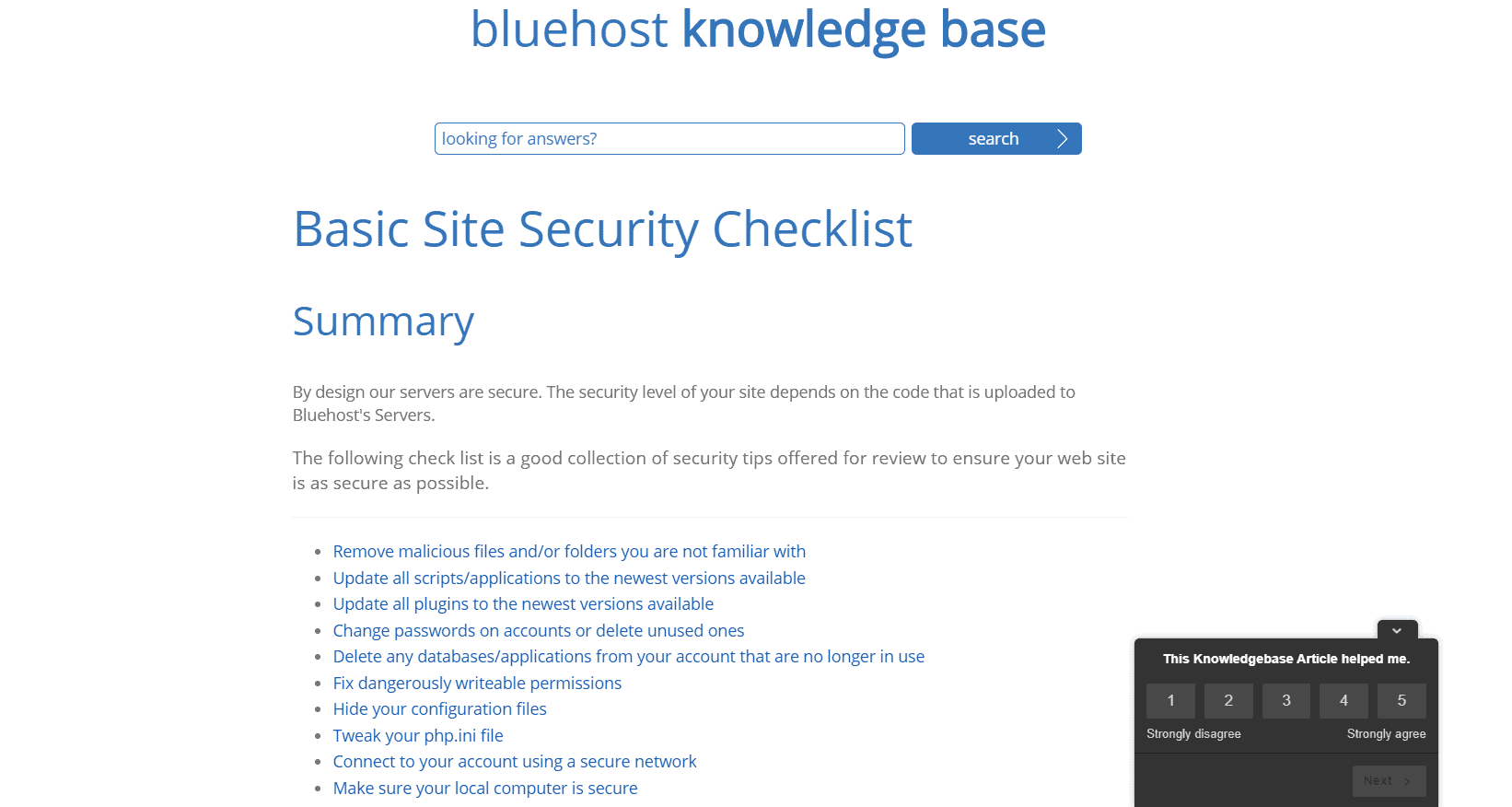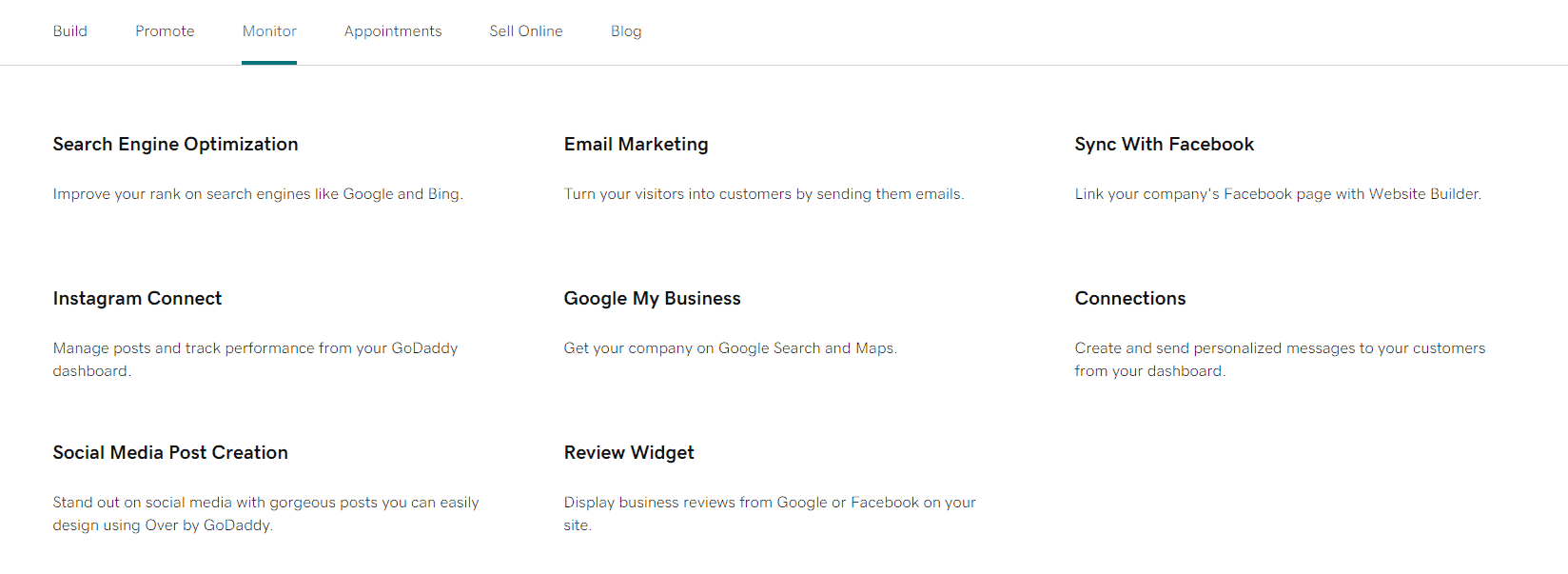Disclosure: Aussie Hosting is community run. We sometimes earn a commission when you buy hosting through our links. Learn more about our disclosure.
Bluehost vs GoDaddy
![]() Today we’re going to look at and compare two of the top dogs in the hosting space: Bluehost and GoDaddy.
Today we’re going to look at and compare two of the top dogs in the hosting space: Bluehost and GoDaddy.
Both companies have been around for a very, very long time, so not only do they have pedigree, but they also have experience and actually power millions upon millions of sites every day.
As such, they are safe bets when it comes to picking your very own web host, especially if its your first.
Bluehost vs GoDaddy Comparison
As things begin to move to an increasingly digital world, whether it’s physical stores opening up storefronts on Shopify, or people using the best free website builders to make their own websites, it’s more important than ever to choose a good host.
Not only will it help save you the trouble of trying to migrate or switch your site later on, but it can actually significantly impact the quality, usability and efficiency of your site.
Of course, the problem is that there are tons of great hosts out there, so the message can get a little bit muddled in the process. Thankfully, you have us here, and we’ll gladly help!
Speed
![]() One of the most important things that you’ll need to have for your site is good speed. There’s very few things that are worse in the world of the internet than a slow loading website.
One of the most important things that you’ll need to have for your site is good speed. There’s very few things that are worse in the world of the internet than a slow loading website.
In fact, google itself suggests that websites should generally load in under 3 seconds, with anything above that considered a relatively ‘slow’ website.
While website optimization certainly plays a part in that, another important thing to consider is a host that already has some speedy servers. This can help somewhat mitigate an nonoptimal website design, at least until you can get some work done on it.
One thing that helps us see how good a website is doing outside of web page optimization, is time to first byte. No, this isn’t how long it takes you to eat a slice of pizza, but instead it denotes the time it takes for a server to respond to a request. This period indicates the raw speed of the server, since it doesn’t actually need to load your site.
Bluehost
In terms of load time, Bluehost does relatively well. First bite time is around ~0.33 to 0.35 seconds, which is pretty fast. Load time is also reasonably good at around ~2.49 to 2.51 seconds, so it’s well under the suggested 3 seconds of Google.
GoDaddy
GoDaddy does both a bit worse and a bit better at the same time. First bite time is an abysmal ~ 1.23 to 1.25 seconds, which is really bad. On the other hand, load time is actually relatively good at around ~ 2.74 to 2.76. So again, GoDaddy is below the 3 seconds that Google recommends.
Which One Has the Best Speed
So which has the best speed? Well, they’re both actually pretty much the same in this regard. Yes, GoDaddy has a terrible first bite time, so their server performance isn’t great, but overall it seems to not have that big an impact.
Another thing to remember is that these are rough numbers, and they can vary a bit depending on where the requests come from. Think of speed tests like this as ‘ideal’ situations where the requests come closer to the server.
In the real world, requests might come from Antarctica for all we know, and there aren’t that many servers close to there.
So which one should you pick? Well, Bluehost edges out GoDaddy very marginally, so don’t let speed be the deciding factor when it comes to picking a hosting site.
Uptime
![]() Another important thing to have along with speed is excellent uptime. Ultimately, there’s really no point having a website if it goes down regularly or when people need to access it.
Another important thing to have along with speed is excellent uptime. Ultimately, there’s really no point having a website if it goes down regularly or when people need to access it.
This is especially compounded if you’re doing some kind of marketing that leads to a high-level of traffic, as is especially the case with small business hosting.
A good uptime, along with good speed, is a great indicator that their servers will be able to handle most traffic.
Bluehost
Starting with Bluehost, they interesting don’t actually guarantee any uptime, which isn’t something you usually see with a top-tier host.
That being said, Bluehost does have excellent uptimes of 99.9%, so basically, their servers are always running no matter what. This is essentially a perfect up time, with that extra 00.1% being nothing more than random, uncontrollable downtime.
GoDaddy
GoDaddy on the other hand does attempt to guarantee an uptime, specifically an uptime of 99.9%. That is ironic then, since their actual uptime is more like 99.0%, which is worse than Bluehost. Of course, 0.09% is an incredibly marginal amount, and for most people that shouldn’t be an issue.

That being said, there have been complaints from customers about downtimes and outages, which is problematic.
From what we understand, the issues tend to come at the intersection of high-traffic and good response times. Truthfully, that’s not necessarily a deal breaker for most, especially if you don’t often experience large surges of traffic.
Which Has the Best Uptime
Clearly Bluehost is superior here, but only marginally. If you tend to run a lot of marketing campaigns, or do anything that generally sees surges of high-traffic, Bluehost is probably the best option here. That being said, uptime, much like speed, shouldn’t be a major consideration for you when it comes to picking a host.
Security
![]() While not something people often think about, security is an important aspect of your website and like most great domain registrars, you’ll find that added security is 100% . . . well, added.
While not something people often think about, security is an important aspect of your website and like most great domain registrars, you’ll find that added security is 100% . . . well, added.
While for the most part there tends to be a base level of security, such as SSL, additional features tend to cost extra and are heavily marketed by both companies.
Another thing to think about when it comes to security, is the security of your data and that means how often it’s backed up.
Bluehost
So starting with Bluehost and backups . . . well they simply just do it whenever they feel like it. That means there is no regular backup schedule for you to rely on, and in fact, Bluehost themselves take no responsibility for lost or corrupted data that hasn’t been backed up.
So that basically means that you have to deal with your own backup if you want to be 100% that everything is working well.
As for security, you get yourself SSL and PHP 7 on all plans by default, as well as SFTP and SSH if you need it. That being said, they do heavily promote Sitelock and encourage you to get it, which of course costs money.
You do get things like protection from malware and other malicious attacks, as well as things like SQL Injection protection, file-level scanning, and a reduced ticket time of 12 hours.

So yes, proper security on Bluehost will cost you extra.
As for the servers themselves, they are protected with uninterruptible power supplies, with round-the-clock monitoring, so your site will be secure from power grid failure.
GoDaddy
In terms of security, GoDaddy has a lot of similarities to Bluehost, in that it offers SSH and PHP 7 as basic in all plans. Unfortunately, if you want additional security features, you’re going to have to pay. Starting at $5.59/month and going up to $25/month, you get a range of security upgrades.
Sadly, the SSL certificate doesn’t come until the $18.99/month plan, so you are going to pay steep for proper security when it comes to GoDaddy (even if you just get their SSL certificate on their own).
Moving on to backups, you’ll be happy to know that GoDaddy does do backups, but unfortunately you have to pay for them. Thankfully, it’s only one plan and it’s not too expensive at $2.99/month. This gets you a whole host of things like daily and on-demand backups, one-click restores, malware scanning, and a couple of other things.
The best part of their backup plan though is that it's all safe to the cloud, so it's relatively safe and easy to access at any point in time.
As for the physical servers, like Bluehost they are run by uninterrupted power supplies, with backup generators and around the clock monitoring.
Which Has the Best Security
So this one is a little bit less clear cut because they both seem relatively . . . well not that great.
Bluehost is great because they include more with their basic security, such as SSL, but you will have to buy their Sitelock service to get real levels of protection. Unfortunately the real issue with bluehost is that there’s no option for backups, so you’re left to deal with that on your own.
As for GoDaddy, while it does offer less security features with basic plans, it does have variable cost plans depending on your exact security needs, so you can pay as much as you need. It’s also great in that you can actually buy regular backups with GoDaddy, so you don’t have to deal with it on your own.
So in summation: If you don’t mind dealing with backups on your own, Bluehost is probably better. If a backup solution is important for you, and you are ok with using the cheaper security plans, then GoDaddy is better.
Additional Features
![]() Any additional perks and features are arguably one of the biggest deciding factors when making a choice. This is especially the case for top-tier hosts like the ones we’re looking at, since they’re arguably incredibly similar in almost all other counts.
Any additional perks and features are arguably one of the biggest deciding factors when making a choice. This is especially the case for top-tier hosts like the ones we’re looking at, since they’re arguably incredibly similar in almost all other counts.
Essentially, this is the section that will really be the deciding factor (along with pricing) when making a choice.
Bluehost
So probably one of the best things Bluehost is known for is being an excellent Wordpress host along with a few others. In fact, Wordpress.org itself actually suggestion Bluehost and ranks it at the top of the best Wordpress hosts with over 2million sites served.
This is helped along by the fact that Bluehost has a great one-click Wordpress builder, so you don’t have to waste a lot of time building a website to exact specification and can get things going quickly.
Another great thing about Bluehost is that it has a veritable feast of different plans to pick, from dedicated, to shared, to Wordpress specific. In fact, there are so many options it might be a bit overwhelming for first timers.
Nonetheless, having so many options means you can really break down your needs and fit them to your budget, which isn’t often the case with a lot of other services.
On top of that, all their plans except the Basic one give you unlimited storage, domains, websites and bandwidth. So, as you’ll see in the next section, you don’t actually have to pay that much to get a ton of added value from the deal.
In terms of cPanels, it has an industry standard one, and you can choose to manage several websites through MySQL databases.
The only really annoying thing about Bluehost is that if you want to transfer an already established website from another host, you’ll have to pay a $150 fee. While not necessarily an issue if you’re starting fresh, it’s a big problem if you aren’t. Therefore be very aware of this specific point.
GoDaddy
Bluehost isn’t the only big fish in the pond, and GoDaddy is also well renowned, but for domain registration rather than Wordpress hosting. In fact, GoDaddy hosts over 19million websites, which isn’t actually as many as Bluehost, but it isn’t a number to scoff at either.
So you’ll be happy to know that GoDaddy also has Wordpress hosting plans, although they aren’t as robust as the Bluehost ones. In fact, you’ll be sad to find out that GoDaddy doesn’t give unlimited storage with any plan, which is a big let down if we’re being honest.

That being said, the limit is pretty massive and it’s really a soft limit, so you can always ask for more (although there’s no guarantee they’ll agree).
Much like Bluehost, GoDaddy also gives you unlimited bandwidth, domains and websites, except for the Economy plan, which is equivalent to the Basic with Bluehost. So at least in terms of this, they are relatively equal.
The cPanel on GoDaddy is also industry standard, although it doesn’t allow for control of as many websites as Bluehost does on shared plans.
Finally, GoDaddy doesn’t charge you an arm and a leg to transfer over your website, which is a big plus if you already have a website going and want to transition it over.
Which One Has the Best Features
While both come in relatively close to each other, Bluehost beats out GoDaddy by a reasonably noticeable margin. This is mostly due to their overall better packages compared to GoDaddy when it comes to storage and website administration through cPanel.
That being said, Bluehost does get marks off for charging when you want to transfer a site. Frankly, we’re a bit confused by their decision, but I guess when you’re as big as them, you don’t have to care.
Although, we will say that GoDaddy might general be better for those who don’t have any web development experience, since their website builder is much easier to handle and customize.
Pricing
 Ultimately, regardless of the section above, one of the most important things you’ll likely consider is pricing and getting the most bang for your buck.
Ultimately, regardless of the section above, one of the most important things you’ll likely consider is pricing and getting the most bang for your buck.
Well, you’ll be happy to hear that both hosts actually offer reasonably good cheap options, although they do tack-on or heavily promote additional features like extra security and backups as mentioned in previous sections.
One thing that we will point out before going here is that both these sites offer temporary promotional pricing that brings plan costs down for the first year or however long you chose.
Unfortunately for them, we’re going to be looking at the direct prices, rather than the discounted prices, since that’s actually what you’ll be paying in the long term.
Bluehost
So Bluehost generally breaks their hosting plans in two general categories: Wordpress Hosting and General hosting.
When it comes to their wordpress hosting, it starts at $7.99/month and can go all the way up to $59.99/month. The difference in plans revolve around how big you want to go with your Wordpress site.
For example, the WP Pro category is all about marketing and growing your site, and includes quite a few useful tools like a Market Center and business analysis.
General hosting on the other hand similarly starts at $7.99/month but can go up to a whopping $209.99/month. Again, it largely depends on how big you want to go, with things like dedicated hosting netting at the biggest cost, but also providing the best servers for you to use.
There’s also shared and VPS options if you prefer that too.
All in all, they offer relatively well-priced packages, although there’s a ton of options and it might be overwhelming for beginners.
If you are wondering how Bluehost does in other clashes with top hosts you might want to check out our Siteground vs Bluehost Comparison.
GoDaddy
Sadly this trend of overwhelming options continues with GoDaddy, having nearly 30 different plans to pick from.
Cut up into 6 categories, the cheapest package you’ll find is for $8.99/month and the most expensive can go all the way up to $419/month.
At the more affordable end, you get web and Wordpress hosting plans as well as VPS. Depending on how much money you want to budget for, you get different levels of storage, bandwidth and visitor count.
You also get more and more tools and features such as SSL certificates and SEO Optimization. So really it depends on how much you want to pay.

At the mid-tier you get two different types of business hosting categories, one for Wordpress ECommerce and one for Business hosting. The Wordpress ECommerce plan is simple, since it’s one plane that costs you $29.99/month.
On the other hand, Business Hosting has a range of plans, depending on what kind of site you want to drive, such as Joomia, Magento, or some form of high-traffic site with better specs and unmetered traffic, protection and security.
At the highest tier, you can get yourself a dedicated server; the more you pay, the better its going to be.
Which Has the Best Pricing
While both competitors come pretty close, we’ll probably have to give it to Bluehost here due to the additional features that are bundled into their plans.
On top of that, Bluehost generally has a much better customer support team, with GoDaddy receiving a lot of complaints on that front. So ultimately, we’d probably give this section to Bluehost
In Conclusion
Well, there you have it folks. Bluehost comes out ahead as the clear winner in this fight, although GoDaddy brought in a few good punches themselves. We also did a comparison of SiteGround and HostGator, see the results!
That being said, we will say that GoDaddy is probably better for first timers, since they have a more robust and easier website builder. Of course, if you can afford to get a web developer or administrator to help you, or if you have some skill, experience or interest in learning web development, then Bluehost is the way to go.

